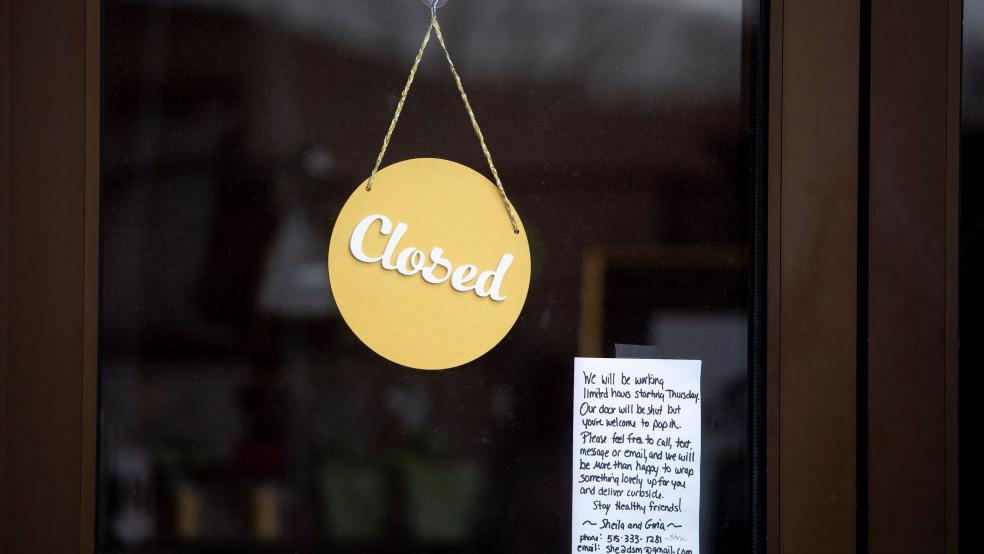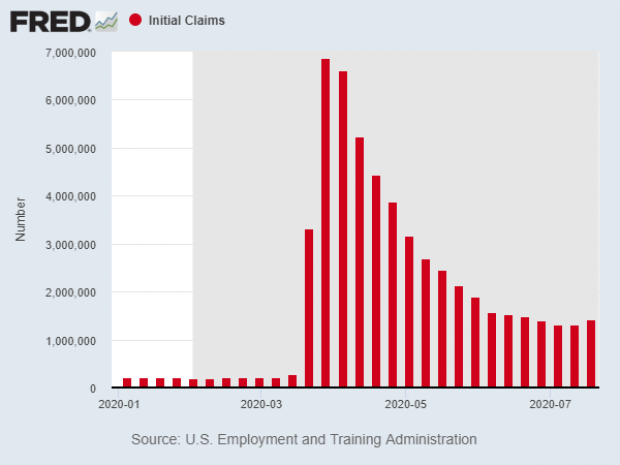More people applied for unemployment benefits last week than the week before, the first time jobless claims have increased on a weekly basis since March.
The 1.42 million claims for the week ending July 18 – an increase of 109,000 from the week before – raises fears that the labor market recovery in May and June, when roughly 7 million jobs were added to the economy, has run out of gas. Applications for Pandemic Unemployment Assistance, which provides aid to workers who are usually ineligible for benefits, also rose last week, to 975,000.
The number of people receiving some kind of unemployment aid remains near highs recorded in June. According to economist Heidi Shierholz of the Economic Policy Institute, 34.3 million workers are either receiving benefits or waiting to learn the results of their applications for assistance.
A July swoon? A recovery tracking index at Oxford Economics fell slightly last week as indicators softened. “While the rebounds in retail sales, employment, and industrial production through June were alluring, policymakers should not fall under the spell of rear-view-mirror economics,” Oxford analysts said Thursday. “As of mid-July, the economy is emerging quite frail from its first rehabilitation phase, and the risks of a renewed downfall are real.”
Robert Brusca, an independent economist quoted by Bloomberg News, said Covid-19 played a central role in the increase in job losses. “Because of resurgence of the virus, a lot of firms that thought they were going to be opening up are instead not opening up,” Brusca said. “While parts of the economy are still recovering, doing better, there are substantial parts, like in the service sector of the economy, that are really feeling the pain.”
Economist Andrew Husby told Bloomberg that while seasonal factors may have influenced the latest data, conditions have been deteriorating for several weeks. “The results reinforce the current high stakes as Congress negotiates the next aid package, including enhanced jobless benefits due to expire next week,” Husby added.
Unemployment benefits running out: The $600 per week in additional unemployment benefits provided by Congress in March run out at the end of the month, with the final checks for most beneficiaries going out this week. Democrats passed a bill in the House that would extend the payments into next year, but Republicans want to cut the payments and are still debating how to handle the issue.
Treasury Secretary Steve Mnuchin told CNBC Thursday that Republicans will propose to replace the $600 per week payment with a smaller amount based on 70% replacement of a worker’s earnings. It’s not clear, however, that state unemployment offices are capable of handling that sort of approach – the flat $600 benefit was passed in March in part because of concerns about states’ abilities to handle anything more complicated – and Mnuchin said they would have a "backup plan” if a solution cannot be worked out.
Democrats said they would continue to push for the higher level of support for the unemployed. House Majority Leader Steny Hoyer (D-MD) said Thursday that the 70% wage replacement proposal is not “the policy we ought to pursue.” However, he also said that said that the plan is “not a dealbreaker.”





